-
 Bitcoin
Bitcoin $86,250.6982
1.63% -
 Ethereum
Ethereum $1,890.1026
-0.98% -
 Tether USDt
Tether USDt $1.0000
0.01% -
 XRP
XRP $2.1367
0.29% -
 BNB
BNB $603.5934
-0.76% -
 Solana
Solana $129.4201
2.45% -
 USDC
USDC $1.0000
0.00% -
 Dogecoin
Dogecoin $0.1724
0.45% -
 Cardano
Cardano $0.6839
0.62% -
 TRON
TRON $0.2381
0.57% -
 Toncoin
Toncoin $3.9840
-0.47% -
 Chainlink
Chainlink $13.8431
-2.30% -
 UNUS SED LEO
UNUS SED LEO $9.3956
0.41% -
 Stellar
Stellar $0.2705
-1.46% -
 Avalanche
Avalanche $19.2650
-0.80% -
 Sui
Sui $2.4309
0.03% -
 Shiba Inu
Shiba Inu $0.0...01260
-0.64% -
 Hedera
Hedera $0.1716
0.58% -
 Polkadot
Polkadot $4.1457
-0.42% -
 Litecoin
Litecoin $85.5964
0.72% -
 Bitcoin Cash
Bitcoin Cash $308.6728
-0.07% -
 MANTRA
MANTRA $6.3356
0.99% -
 Bitget Token
Bitget Token $4.5842
-0.52% -
 Dai
Dai $0.9997
-0.04% -
 Ethena USDe
Ethena USDe $0.9999
0.01% -
 Hyperliquid
Hyperliquid $13.7596
4.34% -
 Pi
Pi $0.6794
-3.81% -
 Monero
Monero $219.4683
1.07% -
 Uniswap
Uniswap $6.1878
-0.70% -
 Aptos
Aptos $5.3777
0.02%
How to purchase mining equipment for FIL mining?
FIL mining requires robust storage servers, high-capacity drives, and strong network connectivity, with costs ranging from thousands to hundreds of thousands based on scale.
Apr 01, 2025 at 09:49 pm
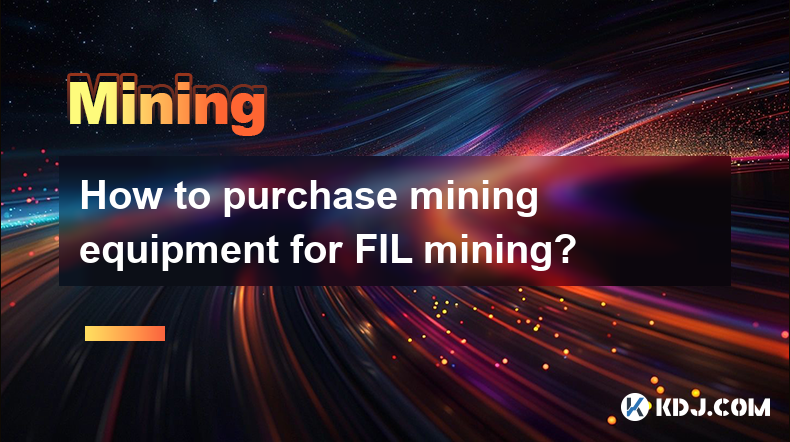
Understanding FIL Mining Hardware Requirements
Filecoin (FIL) mining, unlike Bitcoin mining, doesn't rely on ASICs (Application-Specific Integrated Circuits). Instead, it utilizes storage-based mining, requiring powerful storage hardware and a robust network connection. This means you'll need to invest in storage servers, often referred to as storage nodes, with substantial storage capacity and processing power. The specific requirements depend on the desired mining scale and network conditions. Choosing the right hardware is crucial for profitability and efficient operation.
Assessing Your Budget and Mining Scale
Before diving into purchasing, carefully assess your budget. The cost of FIL mining hardware can range significantly, from a few thousand dollars for a small-scale operation to hundreds of thousands for a larger-scale setup. Consider your financial resources and risk tolerance. Determine the size of your operation – are you aiming for a small, home-based setup or a larger-scale data center operation? This will directly influence the type and quantity of equipment you need. Remember to factor in ongoing operational costs like electricity and internet.
Choosing the Right Storage Hardware
The core component of FIL mining is storage. You need high-capacity hard drives or solid-state drives (SSDs). SSDs offer faster speeds, but HDDs provide a more cost-effective solution for large storage needs. Consider the reliability and durability of the drives, as data loss can significantly impact your mining profitability. Research reputable brands known for their reliability in data center environments. The amount of storage you need depends on your desired sector size and network participation.
Selecting Suitable Servers and Network Infrastructure
Your storage drives won't operate independently. You need servers to manage and control them. These servers require sufficient processing power (CPU) and RAM to handle the demands of the Filecoin protocol. The choice of server depends on the number of drives and your desired storage capacity. Ensure your server has sufficient network connectivity to maintain a stable connection to the Filecoin network. A high-bandwidth, low-latency internet connection is essential for efficient mining.
Sourcing Your Mining Equipment
There are several avenues for purchasing FIL mining equipment. You can buy new equipment from reputable hardware vendors, ensuring warranty and support. Alternatively, you can explore the used market, potentially saving money, but carefully inspect the equipment to ensure its functionality and reliability. Be wary of scams and ensure you're purchasing from trusted sources. Online marketplaces and specialized hardware retailers are common options.
Setting Up Your Mining Rig
Once you've acquired the necessary hardware, you need to set up your mining rig. This involves physically connecting the drives to the server, installing the necessary software, and configuring the system to participate in the Filecoin network. Follow the Filecoin protocol's guidelines carefully to ensure proper setup and avoid errors. The specific steps involved depend on your chosen hardware and software.
Software and Configuration
Filecoin mining requires specific software to interact with the network. You will need to install and configure the Filecoin client software on your server. This software manages your storage, interacts with the network, and handles the mining process. Thoroughly read the documentation and follow the instructions carefully. Incorrect configuration can lead to inefficiencies or disqualification from the network.
Power Consumption and Cooling
FIL mining, while not as energy-intensive as Bitcoin mining, still consumes significant power. The energy consumption will depend on the number and type of drives, servers, and other components. Ensure you have adequate power supply and cooling to prevent overheating and system failure. Proper cooling is crucial for maintaining the longevity and efficiency of your equipment.
Ongoing Maintenance and Monitoring
After setting up your mining rig, regular maintenance and monitoring are essential. This involves monitoring system performance, checking drive health, and ensuring network connectivity. Regular software updates are crucial for security and optimal performance. Addressing any issues promptly can prevent significant problems and downtime.
Frequently Asked Questions
Q: What is the minimum storage capacity required for FIL mining?
A: There's no strict minimum, but a significant amount of storage is needed for profitable mining. The required capacity depends on the network conditions and competition. Starting with a substantial amount is recommended.
Q: Can I use consumer-grade hard drives for FIL mining?
A: While possible, consumer-grade drives might not be ideal due to potential reliability issues and lower performance compared to enterprise-grade drives. Enterprise drives are designed for 24/7 operation.
Q: How much does it cost to start FIL mining?
A: The cost varies drastically depending on the scale of your operation. A small-scale setup might cost a few thousand dollars, while a large-scale operation could cost hundreds of thousands or more.
Q: Where can I buy FIL mining equipment?
A: You can purchase equipment from various online retailers, hardware vendors, or even the used market. Always verify the seller's legitimacy and the equipment's condition.
Q: Is FIL mining profitable?
A: Profitability depends on several factors, including hardware costs, electricity prices, network difficulty, and FIL's price. Thorough research and cost analysis are crucial before investing.
Q: What are the risks associated with FIL mining?
A: Risks include hardware failure, network changes, price volatility of FIL, and potential software issues. Proper planning and risk mitigation strategies are important.
Q: How much electricity will my FIL mining operation consume?
A: Electricity consumption depends on the size and type of equipment. It's crucial to estimate your power usage and factor in the cost of electricity into your profitability calculations. Using energy-efficient hardware can help minimize costs.
Q: Do I need specialized technical skills to mine FIL?
A: While not requiring extremely advanced skills, some technical knowledge is necessary for setting up and maintaining the mining rig. Familiarity with server administration and networking is beneficial.
Disclaimer:info@kdj.com
The information provided is not trading advice. kdj.com does not assume any responsibility for any investments made based on the information provided in this article. Cryptocurrencies are highly volatile and it is highly recommended that you invest with caution after thorough research!
If you believe that the content used on this website infringes your copyright, please contact us immediately (info@kdj.com) and we will delete it promptly.
- Grayscale Launches Two New Bitcoin ETFs: BTCC and BPI
- 2025-04-03 02:05:12
- Bitcoin (BTCUSD) Has Been on an Upward Trajectory Despite Volatility in Crypto and Traditional Markets
- 2025-04-03 02:05:12
- Ripple Integrates Its USD-Backed Stablecoin to Cross-Border Payments System
- 2025-04-03 02:00:12
- Dogecoin (DOGE) Forms Inverse H&S Pattern, Presenting Immediate Breakout Targets
- 2025-04-03 02:00:12
- Retesting the 61.8% Fibonacci Retracement Level Could Be a Defining Moment for the SOL/USD Pair
- 2025-04-03 01:55:13
- Ozak AI (OZ) Could Be the Next 1000x Gainer, Not Gold
- 2025-04-03 01:55:13
Related knowledge
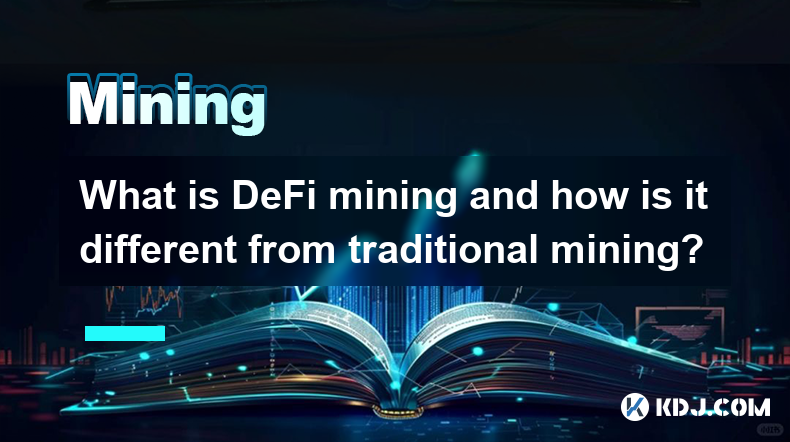
What is DeFi mining and how is it different from traditional mining?
Apr 02,2025 at 09:50am
DeFi mining, also known as yield farming or liquidity mining, is a process within the decentralized finance (DeFi) ecosystem where users provide liquidity to decentralized platforms in exchange for rewards. Unlike traditional mining, which involves solving complex mathematical problems to validate transactions and add them to a blockchain, DeFi mining f...
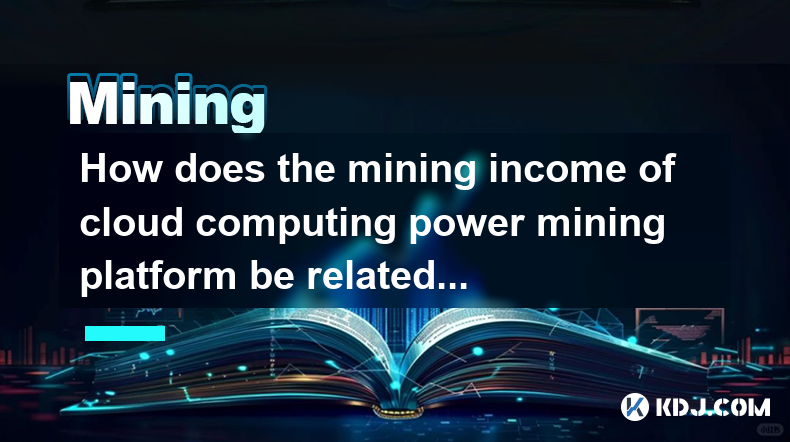
How does the mining income of cloud computing power mining platform be related to mining pool allocation?
Apr 02,2025 at 01:56am
The relationship between the mining income of a cloud computing power mining platform and the allocation of mining pools is a crucial aspect of cryptocurrency mining. Mining income is influenced by various factors such as the efficiency of the mining hardware, electricity costs, and the specific cryptocurrency being mined. However, the allocation of min...
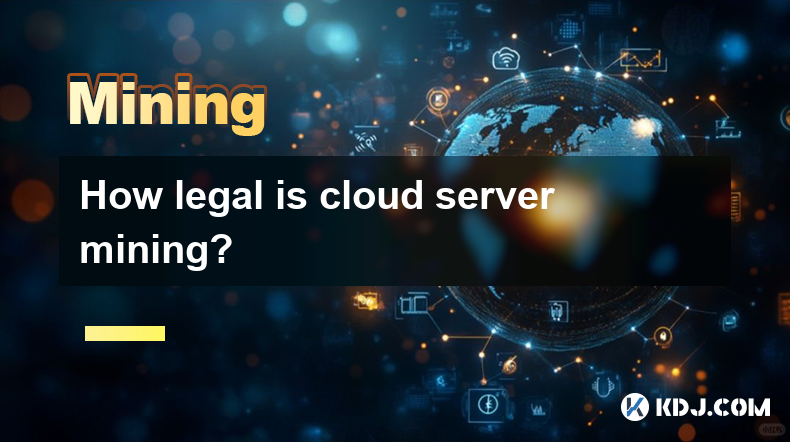
How legal is cloud server mining?
Apr 01,2025 at 08:08am
Cloud server mining has become an increasingly popular method for individuals and companies to participate in cryptocurrency mining without the need for expensive hardware and high electricity costs. However, the legality of cloud server mining can be a complex issue, as it varies by jurisdiction and depends on several factors. This article will explore...
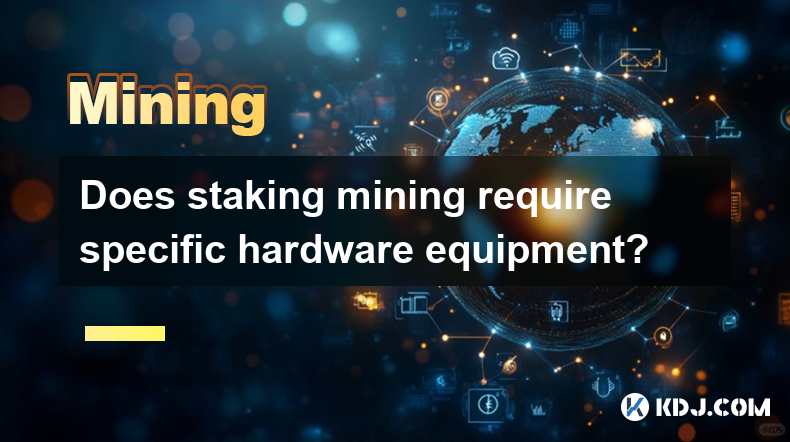
Does staking mining require specific hardware equipment?
Apr 02,2025 at 08:21am
Staking mining, often referred to simply as staking, is a process used by various cryptocurrencies to secure their networks and validate transactions. Unlike traditional mining, which often requires specialized hardware like ASICs (Application-Specific Integrated Circuits) or high-performance GPUs (Graphics Processing Units), staking typically does not ...
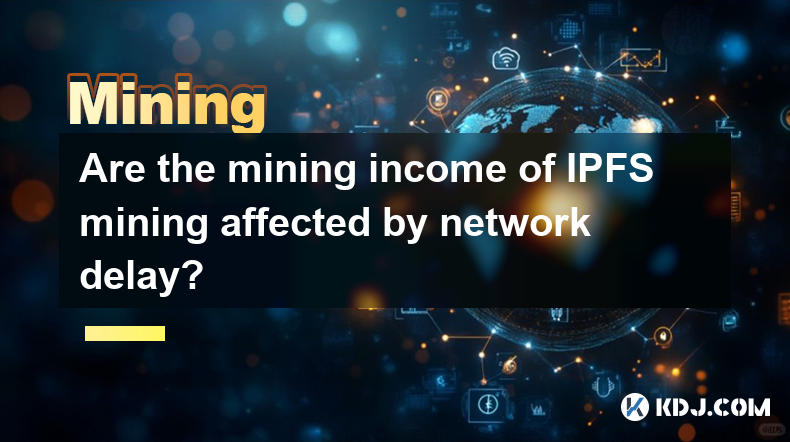
Are the mining income of IPFS mining affected by network delay?
Apr 01,2025 at 09:36pm
Are the Mining Incomes of IPFS Mining Affected by Network Delay? Understanding IPFS Mining and Network Delay's ImpactIPFS (InterPlanetary File System) mining, unlike Bitcoin mining, doesn't involve solving complex cryptographic puzzles. Instead, it focuses on providing storage and bandwidth to the network. Miners earn rewards for storing and sharing dat...
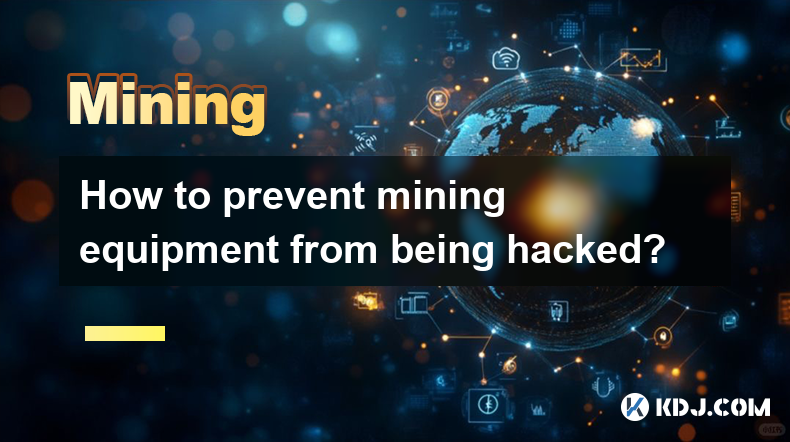
How to prevent mining equipment from being hacked?
Apr 01,2025 at 06:22am
Understanding the ThreatsCryptocurrency mining, while potentially lucrative, exposes your equipment to various cyber threats. These threats range from simple malware infections that steal your mining profits to sophisticated attacks that hijack your entire operation. Understanding these threats is the first step in effective protection. This includes r...

What is DeFi mining and how is it different from traditional mining?
Apr 02,2025 at 09:50am
DeFi mining, also known as yield farming or liquidity mining, is a process within the decentralized finance (DeFi) ecosystem where users provide liquidity to decentralized platforms in exchange for rewards. Unlike traditional mining, which involves solving complex mathematical problems to validate transactions and add them to a blockchain, DeFi mining f...

How does the mining income of cloud computing power mining platform be related to mining pool allocation?
Apr 02,2025 at 01:56am
The relationship between the mining income of a cloud computing power mining platform and the allocation of mining pools is a crucial aspect of cryptocurrency mining. Mining income is influenced by various factors such as the efficiency of the mining hardware, electricity costs, and the specific cryptocurrency being mined. However, the allocation of min...

How legal is cloud server mining?
Apr 01,2025 at 08:08am
Cloud server mining has become an increasingly popular method for individuals and companies to participate in cryptocurrency mining without the need for expensive hardware and high electricity costs. However, the legality of cloud server mining can be a complex issue, as it varies by jurisdiction and depends on several factors. This article will explore...

Does staking mining require specific hardware equipment?
Apr 02,2025 at 08:21am
Staking mining, often referred to simply as staking, is a process used by various cryptocurrencies to secure their networks and validate transactions. Unlike traditional mining, which often requires specialized hardware like ASICs (Application-Specific Integrated Circuits) or high-performance GPUs (Graphics Processing Units), staking typically does not ...

Are the mining income of IPFS mining affected by network delay?
Apr 01,2025 at 09:36pm
Are the Mining Incomes of IPFS Mining Affected by Network Delay? Understanding IPFS Mining and Network Delay's ImpactIPFS (InterPlanetary File System) mining, unlike Bitcoin mining, doesn't involve solving complex cryptographic puzzles. Instead, it focuses on providing storage and bandwidth to the network. Miners earn rewards for storing and sharing dat...

How to prevent mining equipment from being hacked?
Apr 01,2025 at 06:22am
Understanding the ThreatsCryptocurrency mining, while potentially lucrative, exposes your equipment to various cyber threats. These threats range from simple malware infections that steal your mining profits to sophisticated attacks that hijack your entire operation. Understanding these threats is the first step in effective protection. This includes r...
See all articles
























































































